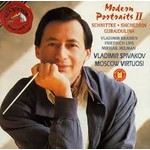
MARBECKS COLLECTABLE: Modern Portraits II
 $30.00
Low Stock
add to cart
$30.00
Low Stock
add to cart
ALFRED SCHNITTKE / RODION SHCHEDRIN / SOFIYA GUBALDULINA
MARBECKS COLLECTABLE: Modern Portraits II
Vladimir Spivakov (director) / Moscow Virtuosi
[ RCA Victor Red Seal / CD ]
Release Date: Wednesday 1 December 1993
"Here is a neat conspectus of Soviet music for chamber orchestra forces in the immediate post-Shostakovich years. Schnittke in 1979 was already on his way out of his familiar Gothic-horror juxtaposition of styles. His Concerto for Piano and Strings may still confront emblems of religious ritual with a demented waltz, a thumping toccata, or a lacerating cadenza, but on the whole its concern is with a single-minded, in-bred intensity. Whether it is any the better for that I am still not sure; but Krainev and Spivakov certainly respond whole-heartedly to its alternation of the hypnotic and the trenchant. On the rival Erato version, which has the recent Piano Duet Concerto for coupling, Postnikova and Rozhdestvensky are broader and if anything even more intense; I would really not care to choose between these performances.
Since the flurry of interest in his music in the late 1960s Rodion Shchedrin has failed to capture Western imaginations to the extent of his younger colleagues. An early reputation as the Soviet Union's first 'licensed modernist' has given way to something at least half-way towards that of old-style apparatchik. Yet his musical personality has always been blessed with a distinctive brand of rhythmical poise and wit, and even if Music for the City of Cothen (composed in 1984 for the Bach tercentenary the following year) comes across as little more than watered-down neo-classical Stravinsky-Dumbarton Oaks, above all-it has more than a few moments of attractive pungency.
Gubaidulina's Seven Last Words of 1982 could hardly be more different. Modelled to some extent on Schutz's and Haydn's settings of the last words of Christ on the Cross, it is shot through with mystical symbolism, not least in its deployment of the bayan (a Russian accordion) and cello to represent the human and spiritual spheres respectively. Some knowledge of this symbolism, certainly more than is vouchsafed on the RCA insert-note, is surely needed to make sense of the work. But if Seven Last Words remains musically less self-sufficient and satisfying than, say, Gubaidulina's Offertorium (DG, 9/89) it is if anything even more representative, not just of this composer but of a highly significant trend in the music of our time. Again the performance is first-rate" Gramophone
Tracks:
Schnittke: Concerto for Piano and Strings 23:10
Shchedrin: Music for the City of Cöthen 18:46
Gubaidulina: Seven Last Words 32:37